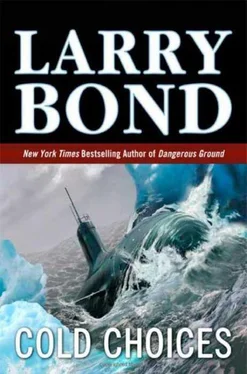Jerry was almost glad the captain hadn’t slept last night. He didn’t even want to try and imagine the kind of dreams he would have had.
Jerry finally spoke. “Sir, we took those risks with you, and we’d do it again, the same way, if you asked us to. We’re all behind you.”
Rudel gave another small, tired smile. “That means a lot, Jerry. Thank you.” He straightening up, and Jerry saw his “old” CO emerge from the ghost he had seen moments earlier. “So we go home, bury our dead, and heal. Simple enough.”
Lieutenant Chandler appeared in the passageway, coming aft from control. Chiefs Hudson and Morrison were both with him, and all three were smiling.
5 October 2008
Twenty-fourth Atomic Submarine Diviziya Headquarters,
Sayda Guba Submarine Base
Rear Admiral Vidchenko stared out his office window, slowly sipping a steaming cup of coffee. The storm had descended with its full fury on the base, and gale-force winds pounded the office building with a wintry mix of snow, sleet, and rain. He glanced at the clock on the wall, 0845, over half an hour since the morning’s main fleet support broadcast window had closed. His chief of staff was late in bringing him the morning’s communiqués.
Vidchenko’s mood matched the foul weather outside. He wondered again why he had accepted this posting in the first place. Sayda Guba was nothing but a primitive frontier outpost in comparison to the cosmopolitan air of Saint Petersburg, a fact his wife never tired of berating him with. Two years, he thought. In two years he could leave this godforsaken land for a comfortable staff position in Moscow, or even back in Saint Petersburg. For two years he could tolerate this cultural exile to the far north. He wasn’t sure his marriage would, though. A knock at the door broke his brooding.
“Enter,” he snapped.
“Good morning, sir,” said Captain First Rank Boris Shepenetnov. “I apologize for being late, but there have been base-wide power problems because of the storm. The communications specialists just printed out your messages.”
“Hrmph,” growled Vidchenko as he sat. He was well aware there were power outages. He’d shaved by candlelight this morning in his quarters. Shepenetnov placed the folder on the desk in front of the admiral and stepped back. Vidchenko scanned the summary list of messages in the folder, and then shot a glaring look at his chief of staff. “Still no word from Petrov?”
“Er, no sir. Nothing was received from Severodvinsk this morning.”
“I see,” replied Vidchenko with growing displeasure. “Tell me, Captain, does every senior officer in this diviziya treat routine deadlines with such callous disregard?” He slapped the folder with his hand to emphasize his point.
“Not at all, comrade Admiral,” answered Shepenetnov defensively. “Captain Petrov has been extremely punctual in maintaining his twice-daily communication schedule. In fact, this is the first time he has ever missed a routine communications period. Either the tactical situation or the elements preclude him from doing so.”
“Nothing should preclude him from following orders, Captain!” Vidchenko bellowed as he jumped to his feet. “It has been my experience as a submarine captain that even in tactical contact with an enemy unit it was possible to report in without compromising my position.”
“With all due respect, Admiral, this is not the Baltic Fleet.” Shepenetnov paused as he forced himself to settle down. He couldn’t afford to lose his temper, not with this admiral. If he continued down this road, it would only result in charges of insubordination. No, Rear Admiral Vidchenko could only be dealt with if one ignored his adversarial nature and focused on the topic at hand. One had to keep to the facts and pay no attention to his barbs.
The chief of staff appreciated Vidchenko’s disciplined approach to running the diviziya. He had little tolerance for pomp and circumstance, thank God, but he lived for schedules and procedures. If schedules weren’t kept and procedures not followed, he would lash out in rage at the offending individual. While not a bad trait in and of itself, Vidchenko’s views were heavily biased by his experience in the Baltic Sea, a well-mannered duck pond in comparison to the Northern Fleet’s operating area.
“Sir, Petrov’s last report is just over twenty-five hours old and he was headed into an area with considerable sea ice. Given the high sea states over the past fourteen hours, it would be foolish to hoist a communications antenna in such an environment. It would be crushed in seconds.”
“I am well versed on the limitations of our submarines’ antenna complexes, Captain,” Vidchenko said with a sneer. “The point is that Petrov has missed not one, but two regular communication periods, and by fleet procedures I need to report him as missing.”
“Technically, sir,” countered Shepenetnov patiently. “You have the discretion to wait until the first alternate period is missed, five hours from now.”
“I intend to do so, but I will not tolerate any of my commanding officers failing to follow fleet protocols. I will deal with Petrov when he returns. Is there anything else of importance to report?”
Relieved that the subject of the discussion was changing, Shepenetnov opened his binder, skimmed down the list, and said, “Only one other matter, sir. PLAs Vepr and Tigr were required to conduct an emergency start-up of their reactors due to a loss of shore power. It appears that their pier lost its transmission station. Repairs won’t be made until after the storm passes.”
Vidchenko sat down as he listened to the additional bad news, a sour expression appearing on his face. “And when do the forecasters predict this storm will pass us by?”
“This is supposed to be the worst of it, sir. They expect conditions to slowly improve in the next two days.”
“So for the next three or four days, precious reactor core life will have to be expended to keep those two submarines livable. What a waste!” Vidchenko almost spat as he spoke those last few words. He quickly scribbled down a note to have yet another discussion with the base commander about the shoddy support his submarines were getting.
“Will there be anything else, comrade Admiral?” inquired Shepenetnov, eager to leave.
“Yes, Captain. Instruct the commanding officers of Vepr and Tigr to institute rigorous electrical power consumption procedures. Only vital equipment and minimal environment support are to be used until repairs to the pier’s transmission stations are made. And send out a message to Petrov ordering him to report his status on the prosecution of the American submarine. Perhaps we can jog his memory to follow routine procedures.”
Severodvinsk
“Captain. Captain, time to wake up.” The voice was faint at first, but grew steadily louder. Suddenly there was a bright white light; Petrov recoiled from its intensity. Instinctively he threw his hands up to block it while grumbling, “Turn the damn light off!”
“He appears to be in reasonable health, Starpom, given the circumstances. He’s going to be a bit stiff, and he’ll probably experience headaches, but I don’t believe he has a concussion,” reported Balanov.
“Thank you, Doctor,” replied Kalinin, a note of relief in his voice.
Still a bit groggy, Petrov rubbed his face and eyes. He started to shiver, and he pulled the loose blanket around him for warmth. “Would someone please tell me what is going on?” he demanded testily.
“Certainly, sir,” said Balanov. “You’ve been asleep for over twelve hours, and your Starpom here became worried when he couldn’t wake you. Naturally, I was very concerned with this report. I was afraid that you might have suffered a concussion during the collision and had slipped into a coma. My examination, though belated, indicates that you are in relatively good condition; barring the minor injuries to your head and shoulder.”
Читать дальше












